innovation
-
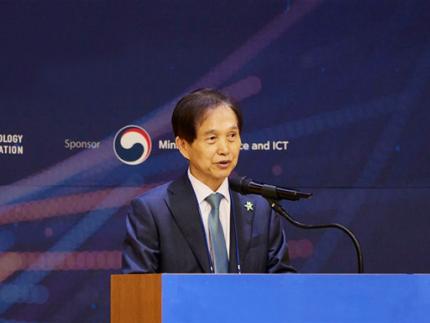 KAIST to Lead the Way in Nurturing Talent and Driving S&T Innovation for a G3 AI Powerhouse
* Focusing on nurturing talent and dedicating to R&D to become a G3 AI powerhouse (Top 3 AI Nations).
* Leading the realization of an "AI-driven Basic Society for All" and developing technologies that leverage AI to overcome the crisis in Korea's manufacturing sector.
* 50 years ago, South Korea emerged as a scientific and technological powerhouse from the ashes, with KAIST at its core, contributing to the development of scientific and technological talent, innovative technology, national industrial growth, and the creation of a startup innovation ecosystem.
As public interest in AI and science and technology has significantly grown with the inauguration of the new government, KAIST (President Kwang Hyung Lee) announced its plan, on June 24th, to transform into an "AI-centric, Value-Creating Science and Technology University" that leads national innovation based on science and technology and spearheads solutions to global challenges.
At a time when South Korea is undergoing a major transition to a technology-driven society, KAIST, drawing on its half-century of experience as a "Starter Kit" for national development, is preparing to leap beyond being a mere educational and research institution to become a global innovation hub that creates new social value.
In particular, KAIST has presented a vision for realizing an "AI-driven Basic Society" where all citizens can utilize AI without alienation, enabling South Korea to ascend to the top three AI nations (G3). To achieve this, through the "National AI Research Hub" project (headed by Kee Eung Kim), led by KAIST representing South Korea, the institution is dedicated to enhancing industrial competitiveness and effectively solving social problems based on AI technology.
< KAIST President Kwang Hyung Lee >
KAIST's research achievements in the AI field are garnering international attention. In the top three machine learning conferences (ICML, NeurIPS, ICLR), KAIST ranked 5th globally and 1st in Asia over the past five years (2020-2024). During the same period, based on the number of papers published in top conferences in machine learning, natural language processing, and computer vision (ICML, NeurIPS, ICLR, ACL, EMNLP, NAACL, CVPR, ICCV, ECCV), KAIST ranked 5th globally and 4th in Asia. Furthermore, KAIST has consistently demonstrated unparalleled research capabilities, ranking 1st globally in the average number of papers accepted at ISSCC (International Solid-State Circuits Conference), the world's most prestigious academic conference on semiconductor integrated circuits, for 19 years (2006-2024).
KAIST is continuously expanding its research into core AI technologies, including hyper-scale AI models (Korean LLM), neuromorphic semiconductors, and low-power AI processors, as well as various application areas such as autonomous driving, urban air mobility (UAM), precision medicine, and explainable AI (XAI).
In the manufacturing sector, KAIST's AI technologies are also driving on-site innovation. Professor Young Jae Jang's team has enhanced productivity in advanced manufacturing fields like semiconductors and displays through digital twins utilizing manufacturing site data and AI-based prediction technology. Professor Song Min Kim's team developed ultra-low power wireless tag technology capable of tracking locations with sub-centimeter precision, accelerating the implementation of smart factories. Technologies such as industrial process optimization and equipment failure prediction developed by INEEJI Co., Ltd., founded by Professor Jaesik Choi, are being rapidly applied in real industrial settings, yielding results. INEEJI was designated as a national strategic technology in the 'Explainable AI (XAI)' field by the government in March.
< Researchers performing data analysis for AI research >
Practical applications are also emerging in the robotics sector, which is closely linked to AI. Professor Jemin Hwangbo's team from the Department of Mechanical Engineering garnered attention by newly developing RAIBO 2, a quadrupedal robot usable in high-risk environments such as disaster relief and rough terrain exploration. Professor Kyoung Chul Kong's team and Angel Robotics Co., Ltd. developed the WalkOn Suit exoskeleton robot, significantly improving the quality of life for individuals with complete lower body paralysis or walking disabilities.
Additionally, remarkable research is ongoing in future core technology areas such as AI semiconductors, quantum cryptography communication, ultra-small satellites, hydrogen fuel cells, next-generation batteries, and biomimetic sensors. Notably, space exploration technology based on small satellites, asteroid exploration projects, energy harvesting, and high-speed charging technologies are gaining attention.
Particularly in advanced bio and life sciences, KAIST is collaborating with Germany's Merck company on various research initiatives, including synthetic biology and mRNA. KAIST is also contributing to the construction of a 430 billion won Merck Bio-Center in Daejeon, thereby stimulating the local economy and creating jobs.
Based on these cutting-edge research capabilities, KAIST continues to expand its influence not only within the industry but also on the global stage. It has established strategic partnerships with leading universities worldwide, including MIT, Stanford University, and New York University (NYU). Notably, KAIST and NYU have established a joint campus in New York to strengthen human exchange and collaborative research. Active industry-academia collaborations with global companies such as Google, Intel, and TSMC are also ongoing, playing a pivotal role in future technology development and the creation of an innovation ecosystem.
These activities also lead to a strong startup ecosystem that drives South Korean industries. The flow of startups, which began with companies like Qnix Computer, Nexon, and Naver, has expanded to a total of 1,914 companies to date. Their cumulative assets amount to 94 trillion won, with sales reaching 36 trillion won and employing approximately 60,000 people. Over 90% of these are technology-based startups originating from faculty and student labs, demonstrating a model that makes a tangible economic contribution based on science and technology.
< Students at work >
Having consistently generated diverse achievements, KAIST has already produced approximately 80,000 "KAISTians" who have created innovation through challenge and failure, and is currently recruiting new talent to continue driving innovation that transforms South Korea and the world.
President Kwang Hyung Lee emphasized, "KAIST will establish itself as a global leader in science and technology, designing the future of South Korea and humanity and creating tangible value." He added, "We will focus on talent nurturing and research and development to realize the new government's national agenda of becoming a G3 AI powerhouse."
He further stated, "KAIST's vision for the AI field, in which it places particular emphasis, is to strive for a society where everyone can freely utilize AI. We will contribute to significantly boosting productivity by recovering manufacturing competitiveness through AI and actively disseminating physical AI, AI robots, and AI mobility technologies to industrial sites."
2025.06.24 View 2610
KAIST to Lead the Way in Nurturing Talent and Driving S&T Innovation for a G3 AI Powerhouse
* Focusing on nurturing talent and dedicating to R&D to become a G3 AI powerhouse (Top 3 AI Nations).
* Leading the realization of an "AI-driven Basic Society for All" and developing technologies that leverage AI to overcome the crisis in Korea's manufacturing sector.
* 50 years ago, South Korea emerged as a scientific and technological powerhouse from the ashes, with KAIST at its core, contributing to the development of scientific and technological talent, innovative technology, national industrial growth, and the creation of a startup innovation ecosystem.
As public interest in AI and science and technology has significantly grown with the inauguration of the new government, KAIST (President Kwang Hyung Lee) announced its plan, on June 24th, to transform into an "AI-centric, Value-Creating Science and Technology University" that leads national innovation based on science and technology and spearheads solutions to global challenges.
At a time when South Korea is undergoing a major transition to a technology-driven society, KAIST, drawing on its half-century of experience as a "Starter Kit" for national development, is preparing to leap beyond being a mere educational and research institution to become a global innovation hub that creates new social value.
In particular, KAIST has presented a vision for realizing an "AI-driven Basic Society" where all citizens can utilize AI without alienation, enabling South Korea to ascend to the top three AI nations (G3). To achieve this, through the "National AI Research Hub" project (headed by Kee Eung Kim), led by KAIST representing South Korea, the institution is dedicated to enhancing industrial competitiveness and effectively solving social problems based on AI technology.
< KAIST President Kwang Hyung Lee >
KAIST's research achievements in the AI field are garnering international attention. In the top three machine learning conferences (ICML, NeurIPS, ICLR), KAIST ranked 5th globally and 1st in Asia over the past five years (2020-2024). During the same period, based on the number of papers published in top conferences in machine learning, natural language processing, and computer vision (ICML, NeurIPS, ICLR, ACL, EMNLP, NAACL, CVPR, ICCV, ECCV), KAIST ranked 5th globally and 4th in Asia. Furthermore, KAIST has consistently demonstrated unparalleled research capabilities, ranking 1st globally in the average number of papers accepted at ISSCC (International Solid-State Circuits Conference), the world's most prestigious academic conference on semiconductor integrated circuits, for 19 years (2006-2024).
KAIST is continuously expanding its research into core AI technologies, including hyper-scale AI models (Korean LLM), neuromorphic semiconductors, and low-power AI processors, as well as various application areas such as autonomous driving, urban air mobility (UAM), precision medicine, and explainable AI (XAI).
In the manufacturing sector, KAIST's AI technologies are also driving on-site innovation. Professor Young Jae Jang's team has enhanced productivity in advanced manufacturing fields like semiconductors and displays through digital twins utilizing manufacturing site data and AI-based prediction technology. Professor Song Min Kim's team developed ultra-low power wireless tag technology capable of tracking locations with sub-centimeter precision, accelerating the implementation of smart factories. Technologies such as industrial process optimization and equipment failure prediction developed by INEEJI Co., Ltd., founded by Professor Jaesik Choi, are being rapidly applied in real industrial settings, yielding results. INEEJI was designated as a national strategic technology in the 'Explainable AI (XAI)' field by the government in March.
< Researchers performing data analysis for AI research >
Practical applications are also emerging in the robotics sector, which is closely linked to AI. Professor Jemin Hwangbo's team from the Department of Mechanical Engineering garnered attention by newly developing RAIBO 2, a quadrupedal robot usable in high-risk environments such as disaster relief and rough terrain exploration. Professor Kyoung Chul Kong's team and Angel Robotics Co., Ltd. developed the WalkOn Suit exoskeleton robot, significantly improving the quality of life for individuals with complete lower body paralysis or walking disabilities.
Additionally, remarkable research is ongoing in future core technology areas such as AI semiconductors, quantum cryptography communication, ultra-small satellites, hydrogen fuel cells, next-generation batteries, and biomimetic sensors. Notably, space exploration technology based on small satellites, asteroid exploration projects, energy harvesting, and high-speed charging technologies are gaining attention.
Particularly in advanced bio and life sciences, KAIST is collaborating with Germany's Merck company on various research initiatives, including synthetic biology and mRNA. KAIST is also contributing to the construction of a 430 billion won Merck Bio-Center in Daejeon, thereby stimulating the local economy and creating jobs.
Based on these cutting-edge research capabilities, KAIST continues to expand its influence not only within the industry but also on the global stage. It has established strategic partnerships with leading universities worldwide, including MIT, Stanford University, and New York University (NYU). Notably, KAIST and NYU have established a joint campus in New York to strengthen human exchange and collaborative research. Active industry-academia collaborations with global companies such as Google, Intel, and TSMC are also ongoing, playing a pivotal role in future technology development and the creation of an innovation ecosystem.
These activities also lead to a strong startup ecosystem that drives South Korean industries. The flow of startups, which began with companies like Qnix Computer, Nexon, and Naver, has expanded to a total of 1,914 companies to date. Their cumulative assets amount to 94 trillion won, with sales reaching 36 trillion won and employing approximately 60,000 people. Over 90% of these are technology-based startups originating from faculty and student labs, demonstrating a model that makes a tangible economic contribution based on science and technology.
< Students at work >
Having consistently generated diverse achievements, KAIST has already produced approximately 80,000 "KAISTians" who have created innovation through challenge and failure, and is currently recruiting new talent to continue driving innovation that transforms South Korea and the world.
President Kwang Hyung Lee emphasized, "KAIST will establish itself as a global leader in science and technology, designing the future of South Korea and humanity and creating tangible value." He added, "We will focus on talent nurturing and research and development to realize the new government's national agenda of becoming a G3 AI powerhouse."
He further stated, "KAIST's vision for the AI field, in which it places particular emphasis, is to strive for a society where everyone can freely utilize AI. We will contribute to significantly boosting productivity by recovering manufacturing competitiveness through AI and actively disseminating physical AI, AI robots, and AI mobility technologies to industrial sites."
2025.06.24 View 2610 -
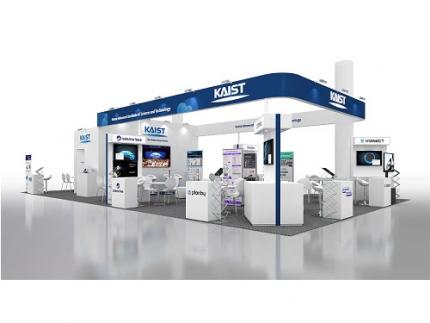 KAIST Wins CES 2025 Innovation Award, Showcasing Innovative Technologies
KAIST will showcase innovative technologies at the world’s largest technology fair, the Consumer Electronics Show (CES 2025). In addition, KAIST startups VIRNECT Inc., Standard Energy Inc., A2US Inc., and Panmnesia, Inc. won the 2025 CES Innovation Awards.
< Image 1. 3D-Graphical Profile of CES 2025 KAIST Exhibition Booth >
KAIST (President Kwang-Hyung Lee) announced on the 31st that it will operate a 140㎡ standalone booth at CES Eureka Park, which will be held in Las Vegas, USA from January 7th to 10th next year, to showcase KAIST's innovative technologies to global companies and investors.
KAIST startups VIRNECT, Standard Energy, A2US, and Panmnesia, Inc. won the 2025 CES Innovation Awards. ▴VIRNECT won the Innovation Award in the ‘Industrial Equipment and Machinery’ category for ‘VisionX’, an AI-based smart glass for industrial sites; ▴Standard Energy Co., Ltd. won the Innovation Award in the ‘Smart City’ category for developing the world’s first vanadium-ion battery; ▴A2US won the Innovation Award in the ‘Environment & Energy’ category for its portable air purifier that eliminates bacteria, odors, and fine dust in the air with just water droplets; ▴Panmnesia, Inc. won the Innovation Award in the ‘Computer Peripherals and Accessories’ category for its ‘CXL-based GPU Memory Expansion Kit’ that can drastically reduce the cost of building AI infrastructure.
< Image 2. (From left on the top row) VIRNECT, Standard Energy, (From left on the bottom row) A2US, Panmnesia, Inc. >
This exhibition will feature 15 startups that are standing out in cutting-edge technologies such as artificial intelligence (AI), robotics, mobility, and sustainability. In particular, AI-based deep tech startups in various industries such as logistics, architecture, and medicine will take up half of the total, showcasing the companies’ innovative AI technologies.
Polyphenol Factory Co.,Ltd introduces ‘Grabity’, a hair loss shampoo launched domestically, which applies the patented ingredient ‘LiftMax 308™’ that forms an instantaneous protective layer on the hair during the shampooing process. A real-time demonstration will be held at this exhibition hall so that visitors can experience the effects of the ingredient directly, and plans to enter the global market starting with the launch on Amazon in the US in January 2025.
VIRNECT will present ‘VisionX’, a prototype that won the Innovation Award this time. The product provides a chatbot AI through an AI voice interface, and has a function that allows users to check the status of the equipment in real time through conversations with the AI and receive troubleshooting guidance through voice conversations, so users can experience it directly at the KAIST Hall.
‘Standard Energy’ plans to exhibit ‘Energy Tile’, an indoor ESS that utilizes the world’s first vanadium ion battery (hereinafter referred to as VIB). VIB is absolutely safe from fire and has high installation flexibility, so it can be applied to smart cities and AI data centers.
‘A2US’ is the only company in the world that has hydroxyl radical water production technology, and won the Innovation Award for its first product, an air purifier. In the future, it is expected to be widely commercialized in air and water purification, smart farms, food tech, and semiconductor cleaning using safe and environmentally friendly hydroxyl radical water.
Panmnesia, Inc. won the CES Innovation Award for its GPU memory expansion solution equipped with its CXL 3.1 IP. By connecting a memory expansion device using Panmnesia’s CXL IP, the GPU’s memory capacity can be expanded to the terabyte level. Following the Innovation Award for ‘CXL-equipped AI Accelerator’ at CES 2024 last year, it is the only company to have won the Innovation Award for its AI-oriented CXL solution for two consecutive years.
In addition, technologies from a total of 15 companies will be introduced, including ▴Omelet ▴NEXTWAVE ▴Planby Technologies ▴Cosmo Bee ▴ImpactAI ▴Roen Surgical ▴DIDEN Roboticss ▴Autopedia ▴OAQ ▴HydroXpand ▴BOOKEND ▴Sterri.
On the central stage of the KAIST Hall, KAIST students selected as CES Student Supporters will conduct interviews with participating companies and promote the companies' innovative technologies and solutions. On the 8th, from 5 PM to 7 PM, a KAIST NIGHT event will be held where pre-invited investors and participating companies can network.
Keon Jae Lee, the head of the Institute of Technology Value Creation, said, “Through CES 2025, we will showcase innovative technologies and solutions from startups based on KAIST’s deep science and deep tech, and lead commercialization in cutting-edge technology fields such as AI, robotics, mobility, and environment/energy. KAIST plans to further promote technology commercialization by supporting the growth and marketing of innovative startups through the Institute of Technology Value Creation and by strengthening global networks and expanding cooperation opportunities.”
2024.12.31 View 8408
KAIST Wins CES 2025 Innovation Award, Showcasing Innovative Technologies
KAIST will showcase innovative technologies at the world’s largest technology fair, the Consumer Electronics Show (CES 2025). In addition, KAIST startups VIRNECT Inc., Standard Energy Inc., A2US Inc., and Panmnesia, Inc. won the 2025 CES Innovation Awards.
< Image 1. 3D-Graphical Profile of CES 2025 KAIST Exhibition Booth >
KAIST (President Kwang-Hyung Lee) announced on the 31st that it will operate a 140㎡ standalone booth at CES Eureka Park, which will be held in Las Vegas, USA from January 7th to 10th next year, to showcase KAIST's innovative technologies to global companies and investors.
KAIST startups VIRNECT, Standard Energy, A2US, and Panmnesia, Inc. won the 2025 CES Innovation Awards. ▴VIRNECT won the Innovation Award in the ‘Industrial Equipment and Machinery’ category for ‘VisionX’, an AI-based smart glass for industrial sites; ▴Standard Energy Co., Ltd. won the Innovation Award in the ‘Smart City’ category for developing the world’s first vanadium-ion battery; ▴A2US won the Innovation Award in the ‘Environment & Energy’ category for its portable air purifier that eliminates bacteria, odors, and fine dust in the air with just water droplets; ▴Panmnesia, Inc. won the Innovation Award in the ‘Computer Peripherals and Accessories’ category for its ‘CXL-based GPU Memory Expansion Kit’ that can drastically reduce the cost of building AI infrastructure.
< Image 2. (From left on the top row) VIRNECT, Standard Energy, (From left on the bottom row) A2US, Panmnesia, Inc. >
This exhibition will feature 15 startups that are standing out in cutting-edge technologies such as artificial intelligence (AI), robotics, mobility, and sustainability. In particular, AI-based deep tech startups in various industries such as logistics, architecture, and medicine will take up half of the total, showcasing the companies’ innovative AI technologies.
Polyphenol Factory Co.,Ltd introduces ‘Grabity’, a hair loss shampoo launched domestically, which applies the patented ingredient ‘LiftMax 308™’ that forms an instantaneous protective layer on the hair during the shampooing process. A real-time demonstration will be held at this exhibition hall so that visitors can experience the effects of the ingredient directly, and plans to enter the global market starting with the launch on Amazon in the US in January 2025.
VIRNECT will present ‘VisionX’, a prototype that won the Innovation Award this time. The product provides a chatbot AI through an AI voice interface, and has a function that allows users to check the status of the equipment in real time through conversations with the AI and receive troubleshooting guidance through voice conversations, so users can experience it directly at the KAIST Hall.
‘Standard Energy’ plans to exhibit ‘Energy Tile’, an indoor ESS that utilizes the world’s first vanadium ion battery (hereinafter referred to as VIB). VIB is absolutely safe from fire and has high installation flexibility, so it can be applied to smart cities and AI data centers.
‘A2US’ is the only company in the world that has hydroxyl radical water production technology, and won the Innovation Award for its first product, an air purifier. In the future, it is expected to be widely commercialized in air and water purification, smart farms, food tech, and semiconductor cleaning using safe and environmentally friendly hydroxyl radical water.
Panmnesia, Inc. won the CES Innovation Award for its GPU memory expansion solution equipped with its CXL 3.1 IP. By connecting a memory expansion device using Panmnesia’s CXL IP, the GPU’s memory capacity can be expanded to the terabyte level. Following the Innovation Award for ‘CXL-equipped AI Accelerator’ at CES 2024 last year, it is the only company to have won the Innovation Award for its AI-oriented CXL solution for two consecutive years.
In addition, technologies from a total of 15 companies will be introduced, including ▴Omelet ▴NEXTWAVE ▴Planby Technologies ▴Cosmo Bee ▴ImpactAI ▴Roen Surgical ▴DIDEN Roboticss ▴Autopedia ▴OAQ ▴HydroXpand ▴BOOKEND ▴Sterri.
On the central stage of the KAIST Hall, KAIST students selected as CES Student Supporters will conduct interviews with participating companies and promote the companies' innovative technologies and solutions. On the 8th, from 5 PM to 7 PM, a KAIST NIGHT event will be held where pre-invited investors and participating companies can network.
Keon Jae Lee, the head of the Institute of Technology Value Creation, said, “Through CES 2025, we will showcase innovative technologies and solutions from startups based on KAIST’s deep science and deep tech, and lead commercialization in cutting-edge technology fields such as AI, robotics, mobility, and environment/energy. KAIST plans to further promote technology commercialization by supporting the growth and marketing of innovative startups through the Institute of Technology Value Creation and by strengthening global networks and expanding cooperation opportunities.”
2024.12.31 View 8408 -
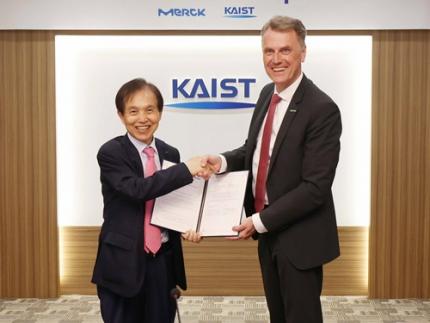 KAIST and Merck Sign MOU to Boost Biotech Innovation
< (From left) KAIST President Kwang-Hyung Lee and Merck CEO Matthias Heinzel >
KAIST (President Kwang-Hyung Lee) signed a Memorandum of Understanding (MOU) with Merck Life Science (CEO Matthias Heinzel) on May 29 to foster innovation and technology creation in advanced biotechnology.
Since May of last year, the two institutions have been discussing multidimensional innovation programs and will now focus on industry-academia cooperation to tackle bioindustry challenges with this MOU as a foundation.
KAIST will conduct joint research projects in various advanced biotechnology fields, such as synthetic biology, mRNA, cell line engineering, and organoids, using the chemical and biological portfolios provided by Merck.
Additionally, KAIST will establish an Experience Lab in collaboration with the Department of Materials Science and Engineering and the Graduate School of Medical Science and Engineering. This lab will support the discovery and analysis of candidate substances in materials science and biology.
Programs to enhance researchers' capabilities will also be offered. Scholarships for graduate students and awards for professors will be implemented. Researchers will have opportunities to participate in global academic events and educational programs hosted by Merck, such as the Curious 2024 Future Insight Conference and the Innovation Cup.
M Ventures, a venture capital subsidiary of Merck Group, will collaborate with KAIST's startup institute to support technology commercialization and continue to develop their startup ecosystem.
The signing ceremony at KAIST's main campus in Daejeon was attended by the CEO of Merck Life Science and the President of KAIST along with representatives from both institutions.
Matthias Heinzel, a member of the Executive Board of Merck and CEO Life Science, said, “This agreement with KAIST is a significant step toward accelerating the development of the life science industry both in Korea and globally. Advancing life science research and fostering the next generation of scientists is essential for discovering new medicines to meet global health needs.”
President Kwang-Hyung Lee responded, “We are pleased to share a vision for scientific advancement with Merck, a leading global technology company. We anticipate that this partnership will strengthen the connection between Merck’s life science business and the global scientific community.”
In March, Merck, a global science and technology company with over 350 years of history, announced a plan to invest 430 billion KRW (€300 million) to build a bioprocessing center in Daejeon, where KAIST is located. This is Merck's largest investment in the Asia-Pacific region.
2024.05.30 View 9627
KAIST and Merck Sign MOU to Boost Biotech Innovation
< (From left) KAIST President Kwang-Hyung Lee and Merck CEO Matthias Heinzel >
KAIST (President Kwang-Hyung Lee) signed a Memorandum of Understanding (MOU) with Merck Life Science (CEO Matthias Heinzel) on May 29 to foster innovation and technology creation in advanced biotechnology.
Since May of last year, the two institutions have been discussing multidimensional innovation programs and will now focus on industry-academia cooperation to tackle bioindustry challenges with this MOU as a foundation.
KAIST will conduct joint research projects in various advanced biotechnology fields, such as synthetic biology, mRNA, cell line engineering, and organoids, using the chemical and biological portfolios provided by Merck.
Additionally, KAIST will establish an Experience Lab in collaboration with the Department of Materials Science and Engineering and the Graduate School of Medical Science and Engineering. This lab will support the discovery and analysis of candidate substances in materials science and biology.
Programs to enhance researchers' capabilities will also be offered. Scholarships for graduate students and awards for professors will be implemented. Researchers will have opportunities to participate in global academic events and educational programs hosted by Merck, such as the Curious 2024 Future Insight Conference and the Innovation Cup.
M Ventures, a venture capital subsidiary of Merck Group, will collaborate with KAIST's startup institute to support technology commercialization and continue to develop their startup ecosystem.
The signing ceremony at KAIST's main campus in Daejeon was attended by the CEO of Merck Life Science and the President of KAIST along with representatives from both institutions.
Matthias Heinzel, a member of the Executive Board of Merck and CEO Life Science, said, “This agreement with KAIST is a significant step toward accelerating the development of the life science industry both in Korea and globally. Advancing life science research and fostering the next generation of scientists is essential for discovering new medicines to meet global health needs.”
President Kwang-Hyung Lee responded, “We are pleased to share a vision for scientific advancement with Merck, a leading global technology company. We anticipate that this partnership will strengthen the connection between Merck’s life science business and the global scientific community.”
In March, Merck, a global science and technology company with over 350 years of history, announced a plan to invest 430 billion KRW (€300 million) to build a bioprocessing center in Daejeon, where KAIST is located. This is Merck's largest investment in the Asia-Pacific region.
2024.05.30 View 9627 -
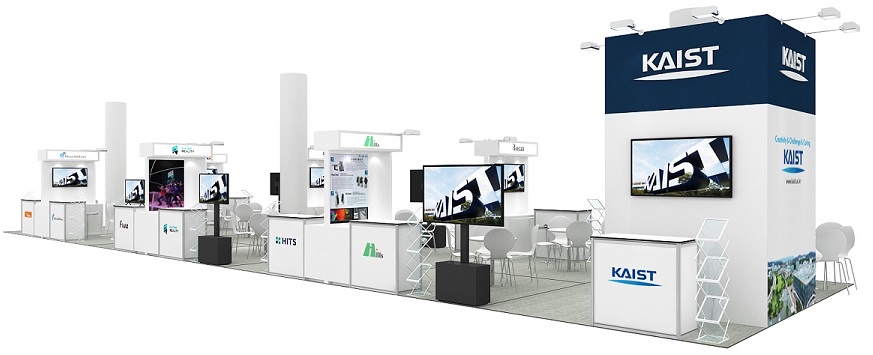 KAIST to showcase a pack of KAIST Start-ups at CES 2023
- KAIST is to run an Exclusive Booth at the Venetian Expo (Hall G) in Eureka Park, at CES 2023, to be held in Las Vegas from Thursday, January 5th through Sunday, the 8th.
- Twelve businesses recently put together by KAIST faculty, alumni, and the start-ups given legal usage of KAIST technologies will be showcased.
- Out of the participating start-ups, the products by Fluiz and Hills Robotics were selected as the “CES Innovation Award 2023 Honoree”, scoring top in their respective categories.
On January 3, KAIST announced that there will be a KAIST booth at Consumer Electronics Show (CES) 2023, the most influential tech event in the world, to be held in Las Vegas from January 3 to 8.
At this exclusive corner, KAIST will introduce the technologies of KAIST start-ups over the exhibition period.
KAIST first started holding its exclusive booth in CES 2019 with five start-up businesses, following up at CES 2020 with 12 start-ups and at CES 2022 with 10 start-ups. At CES 2023, which would be KAIST’s fourth conference, KAIST will be accompanying 12 businesses including start-ups by the faculty members, alumni, and technology transfer companies that just began their businesses with technologies from their research findings that stands a head above others.
To maximize the publicity opportunity, KAIST will support each company’s marketing strategies through cooperation with the Korea International Trade Association (KITA), and provide an opportunity for the school and each startup to create global identity and exhibit the excellence of their technologies at the convention.
The following companies will be at the KAIST Booth in Eureka Park:
The twelve startups mentioned above aim to achieve global technology commecialization in their respective fields of expertise spanning from eXtended Reality (XR) and gaming, to AI and robotics, vehicle and transport, mobile platform, smart city, autonomous driving, healthcare, internet of thing (IoT), through joint research and development, technology transfer and investment attraction from world’s leading institutions and enterprises.
In particular, Fluiz and Hills Robotics won the CES Innovation Award as 2023 Honorees and is expected to attain greater achievements in the future.
A staff member from the KAIST Institute of Technology Value Creation said, “The KAIST Showcase for CES 2023 has prepared a new pitching space for each of the companies for their own IR efforts, and we hope that KAIST startups will actively and effectively market their products and technologies while they are at the convention. We hope it will help them utilize their time here to establish their name in presence here which will eventually serve as a good foothold for them and their predecessors to further global commercialization goals.”
2023.01.04 View 19825
KAIST to showcase a pack of KAIST Start-ups at CES 2023
- KAIST is to run an Exclusive Booth at the Venetian Expo (Hall G) in Eureka Park, at CES 2023, to be held in Las Vegas from Thursday, January 5th through Sunday, the 8th.
- Twelve businesses recently put together by KAIST faculty, alumni, and the start-ups given legal usage of KAIST technologies will be showcased.
- Out of the participating start-ups, the products by Fluiz and Hills Robotics were selected as the “CES Innovation Award 2023 Honoree”, scoring top in their respective categories.
On January 3, KAIST announced that there will be a KAIST booth at Consumer Electronics Show (CES) 2023, the most influential tech event in the world, to be held in Las Vegas from January 3 to 8.
At this exclusive corner, KAIST will introduce the technologies of KAIST start-ups over the exhibition period.
KAIST first started holding its exclusive booth in CES 2019 with five start-up businesses, following up at CES 2020 with 12 start-ups and at CES 2022 with 10 start-ups. At CES 2023, which would be KAIST’s fourth conference, KAIST will be accompanying 12 businesses including start-ups by the faculty members, alumni, and technology transfer companies that just began their businesses with technologies from their research findings that stands a head above others.
To maximize the publicity opportunity, KAIST will support each company’s marketing strategies through cooperation with the Korea International Trade Association (KITA), and provide an opportunity for the school and each startup to create global identity and exhibit the excellence of their technologies at the convention.
The following companies will be at the KAIST Booth in Eureka Park:
The twelve startups mentioned above aim to achieve global technology commecialization in their respective fields of expertise spanning from eXtended Reality (XR) and gaming, to AI and robotics, vehicle and transport, mobile platform, smart city, autonomous driving, healthcare, internet of thing (IoT), through joint research and development, technology transfer and investment attraction from world’s leading institutions and enterprises.
In particular, Fluiz and Hills Robotics won the CES Innovation Award as 2023 Honorees and is expected to attain greater achievements in the future.
A staff member from the KAIST Institute of Technology Value Creation said, “The KAIST Showcase for CES 2023 has prepared a new pitching space for each of the companies for their own IR efforts, and we hope that KAIST startups will actively and effectively market their products and technologies while they are at the convention. We hope it will help them utilize their time here to establish their name in presence here which will eventually serve as a good foothold for them and their predecessors to further global commercialization goals.”
2023.01.04 View 19825 -
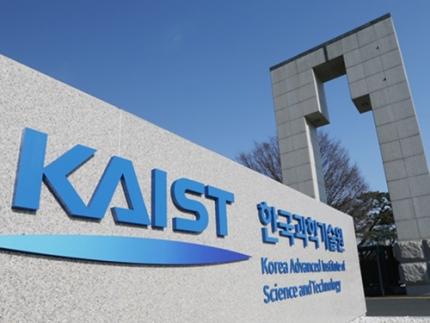 KAIST ISPI Releases Report on the Global AI Innovation Landscape
Providing key insights for building a successful AI ecosystem
The KAIST Innovation Strategy and Policy Institute (ISPI) has launched a report on the global innovation landscape of artificial intelligence in collaboration with Clarivate Plc. The report shows that AI has become a key technology and that cross-industry learning is an important AI innovation. It also stresses that the quality of innovation, not volume, is a critical success factor in technological competitiveness.
Key findings of the report include:
• Neural networks and machine learning have been unrivaled in terms of scale and growth (more than 46%), and most other AI technologies show a growth rate of more than 20%.
• Although Mainland China has shown the highest growth rate in terms of AI inventions, the influence of Chinese AI is relatively low. In contrast, the United States holds a leading position in AI-related inventions in terms of both quantity and influence.
• The U.S. and Canada have built an industry-oriented AI technology development ecosystem through organic cooperation with both academia and the Government. Mainland China and South Korea, by contrast, have a government-driven AI technology development ecosystem with relatively low qualitative outputs from the sector.
• The U.S., the U.K., and Canada have a relatively high proportion of inventions in robotics and autonomous control, whereas in Mainland China and South Korea, machine learning and neural networks are making progress. Each country/region produces high-quality inventions in their predominant AI fields, while the U.S. has produced high-impact inventions in almost all AI fields.
“The driving forces in building a sustainable AI innovation ecosystem are important national strategies. A country’s future AI capabilities will be determined by how quickly and robustly it develops its own AI ecosystem and how well it transforms the existing industry with AI technologies. Countries that build a successful AI ecosystem have the potential to accelerate growth while absorbing the AI capabilities of other countries. AI talents are already moving to countries with excellent AI ecosystems,” said Director of the ISPI Wonjoon Kim.
“AI, together with other high-tech IT technologies including big data and the Internet of Things are accelerating the digital transformation by leading an intelligent hyper-connected society and enabling the convergence of technology and business. With the rapid growth of AI innovation, AI applications are also expanding in various ways across industries and in our lives,” added Justin Kim, Special Advisor at the ISPI and a co-author of the report.
2021.12.21 View 10502
KAIST ISPI Releases Report on the Global AI Innovation Landscape
Providing key insights for building a successful AI ecosystem
The KAIST Innovation Strategy and Policy Institute (ISPI) has launched a report on the global innovation landscape of artificial intelligence in collaboration with Clarivate Plc. The report shows that AI has become a key technology and that cross-industry learning is an important AI innovation. It also stresses that the quality of innovation, not volume, is a critical success factor in technological competitiveness.
Key findings of the report include:
• Neural networks and machine learning have been unrivaled in terms of scale and growth (more than 46%), and most other AI technologies show a growth rate of more than 20%.
• Although Mainland China has shown the highest growth rate in terms of AI inventions, the influence of Chinese AI is relatively low. In contrast, the United States holds a leading position in AI-related inventions in terms of both quantity and influence.
• The U.S. and Canada have built an industry-oriented AI technology development ecosystem through organic cooperation with both academia and the Government. Mainland China and South Korea, by contrast, have a government-driven AI technology development ecosystem with relatively low qualitative outputs from the sector.
• The U.S., the U.K., and Canada have a relatively high proportion of inventions in robotics and autonomous control, whereas in Mainland China and South Korea, machine learning and neural networks are making progress. Each country/region produces high-quality inventions in their predominant AI fields, while the U.S. has produced high-impact inventions in almost all AI fields.
“The driving forces in building a sustainable AI innovation ecosystem are important national strategies. A country’s future AI capabilities will be determined by how quickly and robustly it develops its own AI ecosystem and how well it transforms the existing industry with AI technologies. Countries that build a successful AI ecosystem have the potential to accelerate growth while absorbing the AI capabilities of other countries. AI talents are already moving to countries with excellent AI ecosystems,” said Director of the ISPI Wonjoon Kim.
“AI, together with other high-tech IT technologies including big data and the Internet of Things are accelerating the digital transformation by leading an intelligent hyper-connected society and enabling the convergence of technology and business. With the rapid growth of AI innovation, AI applications are also expanding in various ways across industries and in our lives,” added Justin Kim, Special Advisor at the ISPI and a co-author of the report.
2021.12.21 View 10502 -
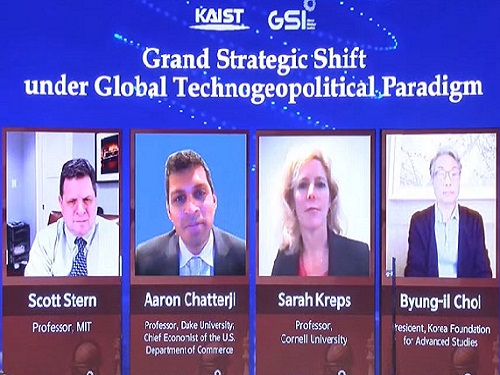 GSI Forum Highlights Global Collaboration Toward a Sustainable Global Economy
The forum stresses global collaboration to make the global value chain more resilient
Speakers at the 5th Global Strategy Institute International Forum on October 28 stressed the importance of global collaboration for rebuilding the global economy and making innovations in national science and technology governance in order to enhance national competitiveness. The forum entitled “Grand Strategic Shift under Global Techno-Geopolitical Paradigm” examined strategies for making the global supply chain more resilient and rebuild the global economy as well as how Korea could advance in the technology race.
Speakers concurred that technology has become an issue of national security. The global supply chain has been disrupted amid the global pandemic and intense conflict between the U.S. and China. Speakers presented a common solution: global collaboration and innovations in science and technology governance.
KAIST President Kwang Hyung Lee said in his opening remarks that the future ‘world map’ may turn out very differently depending on how we prepare and what we envision for the future. He also stressed the importance of technology sovereignty, adding that only those who can create their own new technology independently will be the future leaders.
Prime Minister Boo Kyum Kim and Vice Minister of Science and ICT Hongtaek Yong delivered congratulatory remarks. Keynote speakers included Professor Scott Stern from the MIT Sloan School of Management, Professor Aaron Chatterji from the Fuqua School of Business at Duke University, Professor Sarah Kreps from the Department of Government at Cornell University, SK Group Chairperson Tae-Won Chey, President Woo Il Lee of the Korean Federation of Science and Technology Societies, Professor Young Kwan Yoon at Seoul National University, President Eun Mee Kim of Ewha Womans University, and President Ieehwan Kim of the University of Science and Technology.
During the first session, Professor Chatterji stressed that how to make supply chains resilience will be the key for making long-term strategy with relevant government policy. He said that AI has become a general purpose technology (GPT) and Korea ranked 4th in AI innovation in the world, but how to translate this innovativeness into national strategic leadership will be a new challenge for Korea. He suggested that Korea strengthen its strategic partnerships with allies such as the U.S. and provide opportunities not only for established players but start-ups and entrepreneurs. Meanwhile, Professor Kreps said that industrial policy should also leverage trust and innovations for building technology alliances with a more longer-term approach, without antagonizing certain groups of nations.
Vice President for Planning and Budget Bowon Kim who joined the forum as a discussant pointed out that in this hyper-connected era, nothing can be manufactured in a single company and country without the global supply chain. “In longer-term policy and strategies, we should embrace China as a global economy partner and include all nations around the world.”
Chairman Chey from SK said that the clear role among universities, industry, and the government doesn’t exist any longer. Now, universities are working hard for the commercialization of technology from their labs. Industry is nurturing the talents inept for future industry, and the government is trying to introduce a more private-sector approach. As such, universities, the government, and industry should embrace all-inclusive approaches encompassing global politics and trade to lead on the global stage.
Meanwhile in the second session, all of the speakers stressed innovation in science and technology governance in order to adopt to the new industrial paradigm. They agreed to make prompt innovations and solid collaborative systems among the government ministries to ensure national competitiveness, especially in the field of science and technology.
President Lee from KOFST said Korea should adopt a first mover strategy and the government should adopt a mission-oriented projects and deregulate more. He pointed out that when mandating more autonomy in decision making, scientists and students can make more creative outcomes.
Professor Yoon at SNU stressed the close alliance with the U.S. in the technology race, but suggested that Korea should also seek ways to help minimize the technology gap between advanced and developing countries. Universities should also be allowed more autonomy in running creative curriculum and academic affairs to in order boost the competitiveness of science and technology.
President Kim from Ewha pointed out the role of education as a public good. In some countries, strengthening science and technology can be accomplished with wider educational opportunities in middle and high schools. President Kim also stressed expanding strategic partnerships. She said Korea should expand its alliances and partnerships, not only with the U.S. but with European countries and other niche countries where certain technologies are superior.
President Kim of UST stressed a new science and technology leadership is required to build technology sovereignty and the government should spearhead the deregulations of the government policy.
This GSI forum was co-hosted by two think-tanks at KAIST, the Korea Policy Center for the Fourth Industrial Revolution (KPC4IR) and the Innovation Strategy and Policy Institute (ISPI).
2021.10.28 View 11235
GSI Forum Highlights Global Collaboration Toward a Sustainable Global Economy
The forum stresses global collaboration to make the global value chain more resilient
Speakers at the 5th Global Strategy Institute International Forum on October 28 stressed the importance of global collaboration for rebuilding the global economy and making innovations in national science and technology governance in order to enhance national competitiveness. The forum entitled “Grand Strategic Shift under Global Techno-Geopolitical Paradigm” examined strategies for making the global supply chain more resilient and rebuild the global economy as well as how Korea could advance in the technology race.
Speakers concurred that technology has become an issue of national security. The global supply chain has been disrupted amid the global pandemic and intense conflict between the U.S. and China. Speakers presented a common solution: global collaboration and innovations in science and technology governance.
KAIST President Kwang Hyung Lee said in his opening remarks that the future ‘world map’ may turn out very differently depending on how we prepare and what we envision for the future. He also stressed the importance of technology sovereignty, adding that only those who can create their own new technology independently will be the future leaders.
Prime Minister Boo Kyum Kim and Vice Minister of Science and ICT Hongtaek Yong delivered congratulatory remarks. Keynote speakers included Professor Scott Stern from the MIT Sloan School of Management, Professor Aaron Chatterji from the Fuqua School of Business at Duke University, Professor Sarah Kreps from the Department of Government at Cornell University, SK Group Chairperson Tae-Won Chey, President Woo Il Lee of the Korean Federation of Science and Technology Societies, Professor Young Kwan Yoon at Seoul National University, President Eun Mee Kim of Ewha Womans University, and President Ieehwan Kim of the University of Science and Technology.
During the first session, Professor Chatterji stressed that how to make supply chains resilience will be the key for making long-term strategy with relevant government policy. He said that AI has become a general purpose technology (GPT) and Korea ranked 4th in AI innovation in the world, but how to translate this innovativeness into national strategic leadership will be a new challenge for Korea. He suggested that Korea strengthen its strategic partnerships with allies such as the U.S. and provide opportunities not only for established players but start-ups and entrepreneurs. Meanwhile, Professor Kreps said that industrial policy should also leverage trust and innovations for building technology alliances with a more longer-term approach, without antagonizing certain groups of nations.
Vice President for Planning and Budget Bowon Kim who joined the forum as a discussant pointed out that in this hyper-connected era, nothing can be manufactured in a single company and country without the global supply chain. “In longer-term policy and strategies, we should embrace China as a global economy partner and include all nations around the world.”
Chairman Chey from SK said that the clear role among universities, industry, and the government doesn’t exist any longer. Now, universities are working hard for the commercialization of technology from their labs. Industry is nurturing the talents inept for future industry, and the government is trying to introduce a more private-sector approach. As such, universities, the government, and industry should embrace all-inclusive approaches encompassing global politics and trade to lead on the global stage.
Meanwhile in the second session, all of the speakers stressed innovation in science and technology governance in order to adopt to the new industrial paradigm. They agreed to make prompt innovations and solid collaborative systems among the government ministries to ensure national competitiveness, especially in the field of science and technology.
President Lee from KOFST said Korea should adopt a first mover strategy and the government should adopt a mission-oriented projects and deregulate more. He pointed out that when mandating more autonomy in decision making, scientists and students can make more creative outcomes.
Professor Yoon at SNU stressed the close alliance with the U.S. in the technology race, but suggested that Korea should also seek ways to help minimize the technology gap between advanced and developing countries. Universities should also be allowed more autonomy in running creative curriculum and academic affairs to in order boost the competitiveness of science and technology.
President Kim from Ewha pointed out the role of education as a public good. In some countries, strengthening science and technology can be accomplished with wider educational opportunities in middle and high schools. President Kim also stressed expanding strategic partnerships. She said Korea should expand its alliances and partnerships, not only with the U.S. but with European countries and other niche countries where certain technologies are superior.
President Kim of UST stressed a new science and technology leadership is required to build technology sovereignty and the government should spearhead the deregulations of the government policy.
This GSI forum was co-hosted by two think-tanks at KAIST, the Korea Policy Center for the Fourth Industrial Revolution (KPC4IR) and the Innovation Strategy and Policy Institute (ISPI).
2021.10.28 View 11235 -
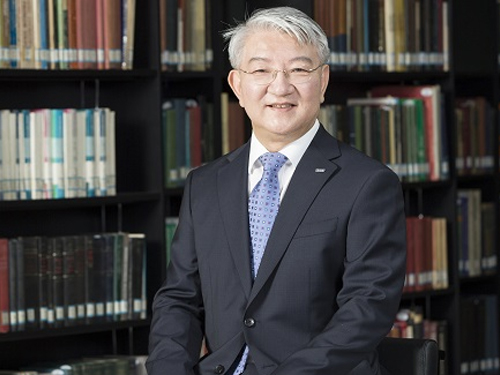 VP Sang Yup Lee Honored with the Pony Chung Innovation Award
Vice President for Research Sang Yup Lee became the recipient of the Innovation Award by the Pony Chung Foundation that was established to honor the late Se-yung Chung, the former chairman of Hyundai Development Company. He will receive 200 million KRW in prize money. Chairman Chung developed Korea’s first domestically manufactured automobile, ‘Pony,’ in the mid-1970s that became the cornerstone of Korea’s auto industry today.
Distinguished Professor Lee, from the Department of Chemical and Biomolecular Engineering, is a pioneering scholar in the field of systems metabolic engineering who developed various micro-organisms for producing a wide range of fuels, chemicals, materials, and natural compounds.
He recently was elected as a foreign member of the Royal Society in the UK and is the first Korean ever elected into the National Academy of Inventors (NAI) in the US as well as one of 13 scholars elected as an International Member of both the National Academy of Sciences (NAS) and the National Academy of Engineering (NAE) in the US.
2021.07.13 View 13096
VP Sang Yup Lee Honored with the Pony Chung Innovation Award
Vice President for Research Sang Yup Lee became the recipient of the Innovation Award by the Pony Chung Foundation that was established to honor the late Se-yung Chung, the former chairman of Hyundai Development Company. He will receive 200 million KRW in prize money. Chairman Chung developed Korea’s first domestically manufactured automobile, ‘Pony,’ in the mid-1970s that became the cornerstone of Korea’s auto industry today.
Distinguished Professor Lee, from the Department of Chemical and Biomolecular Engineering, is a pioneering scholar in the field of systems metabolic engineering who developed various micro-organisms for producing a wide range of fuels, chemicals, materials, and natural compounds.
He recently was elected as a foreign member of the Royal Society in the UK and is the first Korean ever elected into the National Academy of Inventors (NAI) in the US as well as one of 13 scholars elected as an International Member of both the National Academy of Sciences (NAS) and the National Academy of Engineering (NAE) in the US.
2021.07.13 View 13096 -
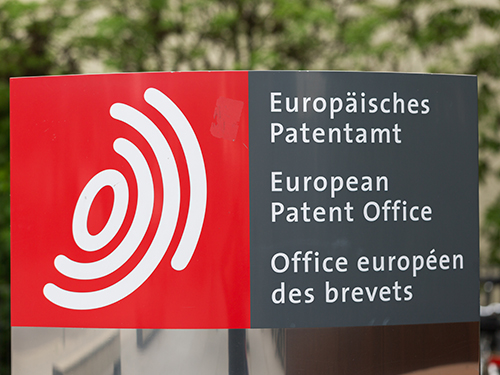 EPO: KAIST the 7th Leading Innovation Cluster Globally
A study published by the European Patent Office (EPO) shows that Korea is the second leading hub for technologies related to the Fourth Industrial Revolution. According to the study, Korea has the second highest innovation intensity for the Fourth Industrial Revolution worldwide with 526 international patent families (IPFs) per million inhabitants, after Finland (654) and well ahead of Japan (405) and the US (258). Korea specializes in IT hardware, power supply, smart goods and services.
The study also reported that the contribution of universities and public research organizations in Korea is very high, standing at 12% compared to the world average of 5.6%. Among others, ETRI (Electronics and Telecommunications Research Institute) topped the universities and public research organizations globally with filings of over 1,500 IPFs between 2010 and 2018. KAIST ranks the 7th with filings of 185, ahead of MIT (179).
The EPO released its study titled 'Patents and the Fourth Industrial Revolution: the Global Technology Trends Enabling the Data-Driven Economy' on December 10. It analyzed all IPFs related to the Fourth Industrial Revolution worldwide between 2000 and 2018. The study found that nearly 40,000 new IPFs were filed for these technologies in 2018 alone. This means they accounted for more than 10% of all patenting activity worldwide that year.
The analysis also showed that Seoul was the world’s most important cluster for Fourth Industrial Revolution patenting activity, accounting for almost 10% of all patents in this field worldwide, growing by 22.7% on average per year between 2010 and 2018, the third highest growth rate of the top 20 clusters. The cluster represented 86% of all Fourth Industrial Revolution patenting activities in Korea. Samsung and LG had a combined share of two-thirds of the cluster’s patent filings, while another 15% was contributed by ETRI.
In the industry sector, Samsung was the clear global leader with over 12,000 IPFs, which corresponds to 4.6% of all Fourth Industrial Revolution inventions between 2000 and 2018. Samsung is followed, albeit by a wide gap of almost 6,000 IPFs filed, by Sony (6,401), and the second Korean company, LG, in third place (6,290).
The patent analysis in this report is based on IPFs. Each IPF represents a unique invention and includes patent applications filed and published in at least two countries or filed with and published by a regional patent office, as well as published international patent applications. The EPO, headquartered in Munich, Germany, is one of the largest patent offices in the world and the leading authority on patent information and searching.
(END)
2020.12.11 View 7281
EPO: KAIST the 7th Leading Innovation Cluster Globally
A study published by the European Patent Office (EPO) shows that Korea is the second leading hub for technologies related to the Fourth Industrial Revolution. According to the study, Korea has the second highest innovation intensity for the Fourth Industrial Revolution worldwide with 526 international patent families (IPFs) per million inhabitants, after Finland (654) and well ahead of Japan (405) and the US (258). Korea specializes in IT hardware, power supply, smart goods and services.
The study also reported that the contribution of universities and public research organizations in Korea is very high, standing at 12% compared to the world average of 5.6%. Among others, ETRI (Electronics and Telecommunications Research Institute) topped the universities and public research organizations globally with filings of over 1,500 IPFs between 2010 and 2018. KAIST ranks the 7th with filings of 185, ahead of MIT (179).
The EPO released its study titled 'Patents and the Fourth Industrial Revolution: the Global Technology Trends Enabling the Data-Driven Economy' on December 10. It analyzed all IPFs related to the Fourth Industrial Revolution worldwide between 2000 and 2018. The study found that nearly 40,000 new IPFs were filed for these technologies in 2018 alone. This means they accounted for more than 10% of all patenting activity worldwide that year.
The analysis also showed that Seoul was the world’s most important cluster for Fourth Industrial Revolution patenting activity, accounting for almost 10% of all patents in this field worldwide, growing by 22.7% on average per year between 2010 and 2018, the third highest growth rate of the top 20 clusters. The cluster represented 86% of all Fourth Industrial Revolution patenting activities in Korea. Samsung and LG had a combined share of two-thirds of the cluster’s patent filings, while another 15% was contributed by ETRI.
In the industry sector, Samsung was the clear global leader with over 12,000 IPFs, which corresponds to 4.6% of all Fourth Industrial Revolution inventions between 2000 and 2018. Samsung is followed, albeit by a wide gap of almost 6,000 IPFs filed, by Sony (6,401), and the second Korean company, LG, in third place (6,290).
The patent analysis in this report is based on IPFs. Each IPF represents a unique invention and includes patent applications filed and published in at least two countries or filed with and published by a regional patent office, as well as published international patent applications. The EPO, headquartered in Munich, Germany, is one of the largest patent offices in the world and the leading authority on patent information and searching.
(END)
2020.12.11 View 7281 -
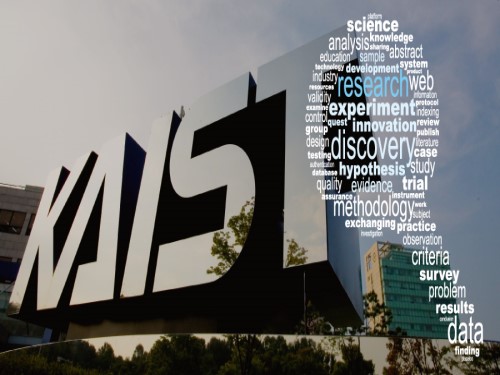 Singularity Professors Represent the Future of Research at KAIST
KAIST will launch a Singularity Professor track, which gives more freedom to researchers for pursuing their research goal. This more flexible and creative research environment institutionally supports researchers as they dive deeper into their research for a longer period of time without any strings attached.
The track was established in an effort to ensure more competitive researchers who can lead the way for new advances in science and technology. This innovative research initiative is part of KAIST’s expansive effort to envision and position itself to build global research competitiveness in the wake of its 50th anniversary in 2021 and beyond.
From this year, KAIST will select two to three research faculty for this special track with full-scale funding for 10 years. Singularity Professors will have their annual performance evaluations waived for 10 years. Instead, their research will be reviewed in their fifth year. The professors in this track will not participate in government-funded R&D projects and be fully funded by KAIST’s endowment.
In addition to those newly hired into this track, Singularity Professorships are opens to existing faculty members. The selection criteria are very simple but highly demanding: one who can pivot an existing academic paradigm or invent a new discipline by presenting a novel scientific theory.
KAIST recently hosted a briefing session for current faculty members and encouraged them to apply for the new track. As part of the selection criteria, the research topic’s innovativeness, feasibility, and appropriateness will be major factors for this track. Employment under this track will continue for up to 20 years. After receiving an evaluation of Very Satisfactory at the end of first ten-year contract, another ten years will be added.
President Sung-Chul Shin, who has pushed for this system since he took office in 2017, said during the briefing session, “It takes quite a long time to bear fruit in academics, especially in science. I am very delighted that KAIST is paving the way for building a longer-term research environment which allows full and longer commitments for research that the faculty is excited to try. That’s the first step to sow the seeds for bearing fruit in academics, especially in science.”
This is a paradigm shift to embrace transformation in a new era. The new institutional strategy supports the change from a fast follower to a first mover during these technologically turbulent times. Under its Global Singularity Research Projects initiative, KAIST already selected focus research topics in the most challenging as well as most creative fields of neuro-rehabilitation, new materials, and molecular optogenetics.
“Especially in the post-COVID era, we have a very clear mission for the world. Our knowledge should translate into global value that can benefit those suffering from this pandemic, and mitigate the inequity coming from the digital discrepancies,” President Shin added.
(END)
2020.07.21 View 10125
Singularity Professors Represent the Future of Research at KAIST
KAIST will launch a Singularity Professor track, which gives more freedom to researchers for pursuing their research goal. This more flexible and creative research environment institutionally supports researchers as they dive deeper into their research for a longer period of time without any strings attached.
The track was established in an effort to ensure more competitive researchers who can lead the way for new advances in science and technology. This innovative research initiative is part of KAIST’s expansive effort to envision and position itself to build global research competitiveness in the wake of its 50th anniversary in 2021 and beyond.
From this year, KAIST will select two to three research faculty for this special track with full-scale funding for 10 years. Singularity Professors will have their annual performance evaluations waived for 10 years. Instead, their research will be reviewed in their fifth year. The professors in this track will not participate in government-funded R&D projects and be fully funded by KAIST’s endowment.
In addition to those newly hired into this track, Singularity Professorships are opens to existing faculty members. The selection criteria are very simple but highly demanding: one who can pivot an existing academic paradigm or invent a new discipline by presenting a novel scientific theory.
KAIST recently hosted a briefing session for current faculty members and encouraged them to apply for the new track. As part of the selection criteria, the research topic’s innovativeness, feasibility, and appropriateness will be major factors for this track. Employment under this track will continue for up to 20 years. After receiving an evaluation of Very Satisfactory at the end of first ten-year contract, another ten years will be added.
President Sung-Chul Shin, who has pushed for this system since he took office in 2017, said during the briefing session, “It takes quite a long time to bear fruit in academics, especially in science. I am very delighted that KAIST is paving the way for building a longer-term research environment which allows full and longer commitments for research that the faculty is excited to try. That’s the first step to sow the seeds for bearing fruit in academics, especially in science.”
This is a paradigm shift to embrace transformation in a new era. The new institutional strategy supports the change from a fast follower to a first mover during these technologically turbulent times. Under its Global Singularity Research Projects initiative, KAIST already selected focus research topics in the most challenging as well as most creative fields of neuro-rehabilitation, new materials, and molecular optogenetics.
“Especially in the post-COVID era, we have a very clear mission for the world. Our knowledge should translate into global value that can benefit those suffering from this pandemic, and mitigate the inequity coming from the digital discrepancies,” President Shin added.
(END)
2020.07.21 View 10125 -
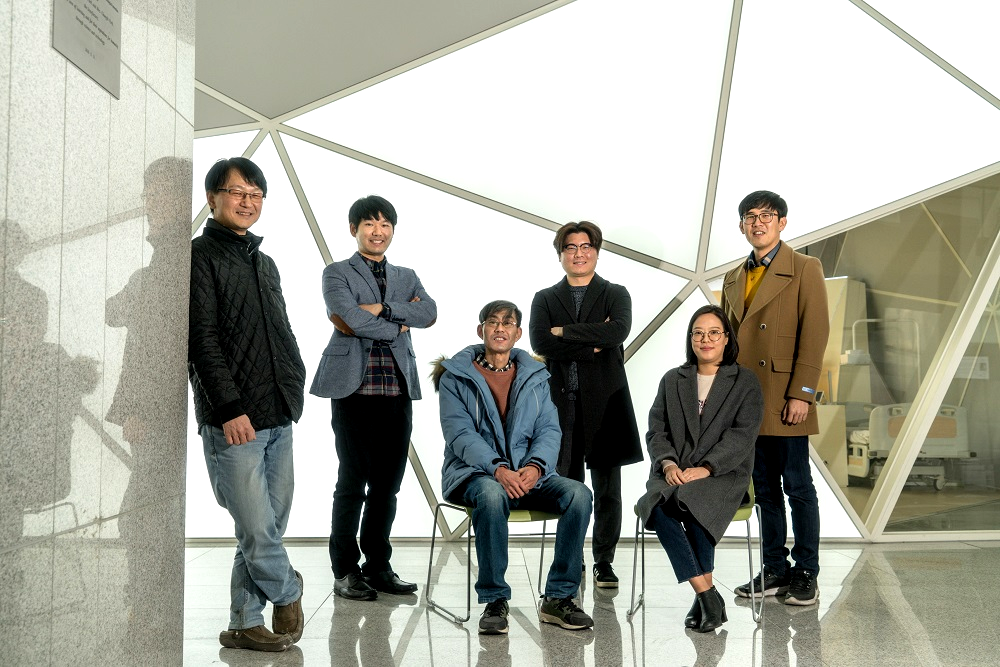 Professor Hojong Chang’s Research Team Wins ISIITA 2020 Best Paper Award
The paper written by Professor Hojong Chang’s research team from KAIST Institute for IT Convergence won the best paper award from the International Symposium on Innovation in Information Technology Application (ISIITA) 2020, held this month at Ton Duc Thang University in Vietnam.
ISIITA is a networking symposium where leading researchers from various fields including information and communications, biotechnology, and computer systems come together and share on the convergence of technology.
Professor Chang’s team won the best paper award at this year’s symposium with its paper, “A Study of Single Photon Counting System for Quantitative Analysis of Luminescence”. The awarded paper discusses the realization of a signal processing system for silicon photomultipliers.
The silicon photomultiplier is the core of a urinalysis technique that tests for sodium and potassium in the body using simple chemical reactions. If our bodily sodium and potassium levels exceed a certain amount, it can lead to high blood pressure, cardiovascular problems, and kidney damage.
Through this research, the team has developed a core technique that quantifies the sodium and potassium discharged in the urine. When the reagent is injected into the urine, a very small amount of light is emitted as a result of the chemical reaction. However, if there is a large amount of sodium and potassium, they interrupt the reaction and reduce the emission. The key to this measurement technique is digitizing the strength of this very fine emission of light. Professor Chang’s team developed a system that uses a photomultiplier to measure the chemiluminescence.
Professor Chang said, “I look forward for this signal processing system greatly helping to prevent diseases caused by the excessive consumption of sodium and potassium through quick and easy detection.”
Researcher Byunghun Han who carried out the central research for the system design added, “We are planning to focus on miniaturizing the developed technique, so that anyone can carry our device around like a cellphone.”
The research was supported by the Ministry of Science and ICT.
(END)
2020.02.27 View 13069
Professor Hojong Chang’s Research Team Wins ISIITA 2020 Best Paper Award
The paper written by Professor Hojong Chang’s research team from KAIST Institute for IT Convergence won the best paper award from the International Symposium on Innovation in Information Technology Application (ISIITA) 2020, held this month at Ton Duc Thang University in Vietnam.
ISIITA is a networking symposium where leading researchers from various fields including information and communications, biotechnology, and computer systems come together and share on the convergence of technology.
Professor Chang’s team won the best paper award at this year’s symposium with its paper, “A Study of Single Photon Counting System for Quantitative Analysis of Luminescence”. The awarded paper discusses the realization of a signal processing system for silicon photomultipliers.
The silicon photomultiplier is the core of a urinalysis technique that tests for sodium and potassium in the body using simple chemical reactions. If our bodily sodium and potassium levels exceed a certain amount, it can lead to high blood pressure, cardiovascular problems, and kidney damage.
Through this research, the team has developed a core technique that quantifies the sodium and potassium discharged in the urine. When the reagent is injected into the urine, a very small amount of light is emitted as a result of the chemical reaction. However, if there is a large amount of sodium and potassium, they interrupt the reaction and reduce the emission. The key to this measurement technique is digitizing the strength of this very fine emission of light. Professor Chang’s team developed a system that uses a photomultiplier to measure the chemiluminescence.
Professor Chang said, “I look forward for this signal processing system greatly helping to prevent diseases caused by the excessive consumption of sodium and potassium through quick and easy detection.”
Researcher Byunghun Han who carried out the central research for the system design added, “We are planning to focus on miniaturizing the developed technique, so that anyone can carry our device around like a cellphone.”
The research was supported by the Ministry of Science and ICT.
(END)
2020.02.27 View 13069 -
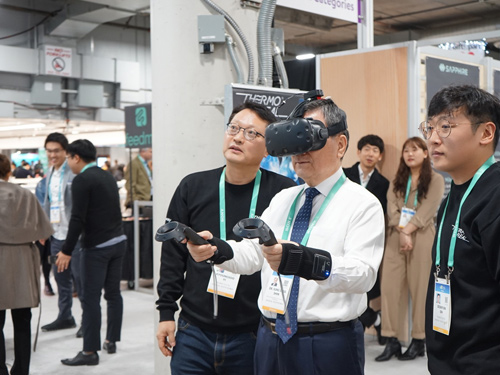 KAIST Showcases Advanced Technologies at CES 2020
< President Sung-Chul Shin experiencing cooling gaming headset developed by TEGWAY >
KAIST Pavilion showcased 12 KAIST startups and alumni companies’ technologies at the International Consumer Electronics Show (CES) 2020 held in Las Vegas last month. Especially four companies, TEGWAY, THE.WAVE.TALK, Sherpa Space, and LiBEST won the CES 2020 Innovation Awards presented by the Consumer Technology Association (CTA). The CTA selects the most innovative items from among all submissions.
TEGWAY spinned off by KAIST Professor Byung Jin Cho already made international headlines for their flexible, wearable, and temperature immersive thermoelectric device. The device was selected as one of the top ten most promising digital technologies by the Netexplo Forum in 2015, and has been expanded into VR, AR, and games.
THE.WAVE.TALK has developed their first home appliance product in collaboration with ID+IM Design Laboratory of KAIST in which Professor Sang-Min Bae heads as creative director. Their real-time bacteria analysis with smart IoT sensor won the home appliances section.
Sherpa Space and LiBEST are the alumni companies. Sherpa Space’s lighting for plants won the sustainability, eco-design, and smart energy section, and LiBEST’s full-range flexible battery won the section for technology for a better world.
KAIST’s Alumni Association, Development Foundation, and the Office of University-Industry Cooperation (OUIC) made every effort to present KAIST technologies to the global market. President Sung-Chul Shin led the delegation comprising of 70 faculty, researchers, and young entrepreneurs. The KAIST Alumni Association fully funded the traveling costs of 30 alumni entrepreneurs and students, establishing scholarship for the CES participation. Ten young entrepreneurs were selected through the KAIST Startup Awards, and 20 current students preparing to start their own companies were selected via recommendation from the respective departments.
Associate Vice President of the OUIC Kyung Cheol Choi said in excitement, “We received many offers for joint research and investment from leading companies around the world,” adding, “We will continue doing our best to generate global value by developing the innovative technologies obtained from education and research into businesses.”
The KAIST pavilion at CES 2020 showcased:
1. flexible thermoelectric device ThermoReal and cooling gaming headset from TEGWAY,
2. wearable flexible battery from LiBEST,
3. applications such as conductive transparent electrode film and transparent heating film from J-Micro,
4. on-device AI solution based on deep learning model compression technology from Nota,
5. portable high resolution brain imaging device from OBELAB,
6. real-time bacteria analysis technology from THE.WAVE.TALK,
7. conversation-based AI-1 radio service platform from Timecode Archive,
8. light source solutions for different stages in a plant’s life cycle from Sherpa Space,
9. skin attached micro-LED patch and flexible piezoelectric acoustic sensor from FRONICS,
10. real-time cardiovascular measurement device from Healthrian,
11. block chain based mobile research documentation system from ReDWit, and
12. student-developed comprehensive healthcare device using a smart mirror.
(END)
2020.01.13 View 14779
KAIST Showcases Advanced Technologies at CES 2020
< President Sung-Chul Shin experiencing cooling gaming headset developed by TEGWAY >
KAIST Pavilion showcased 12 KAIST startups and alumni companies’ technologies at the International Consumer Electronics Show (CES) 2020 held in Las Vegas last month. Especially four companies, TEGWAY, THE.WAVE.TALK, Sherpa Space, and LiBEST won the CES 2020 Innovation Awards presented by the Consumer Technology Association (CTA). The CTA selects the most innovative items from among all submissions.
TEGWAY spinned off by KAIST Professor Byung Jin Cho already made international headlines for their flexible, wearable, and temperature immersive thermoelectric device. The device was selected as one of the top ten most promising digital technologies by the Netexplo Forum in 2015, and has been expanded into VR, AR, and games.
THE.WAVE.TALK has developed their first home appliance product in collaboration with ID+IM Design Laboratory of KAIST in which Professor Sang-Min Bae heads as creative director. Their real-time bacteria analysis with smart IoT sensor won the home appliances section.
Sherpa Space and LiBEST are the alumni companies. Sherpa Space’s lighting for plants won the sustainability, eco-design, and smart energy section, and LiBEST’s full-range flexible battery won the section for technology for a better world.
KAIST’s Alumni Association, Development Foundation, and the Office of University-Industry Cooperation (OUIC) made every effort to present KAIST technologies to the global market. President Sung-Chul Shin led the delegation comprising of 70 faculty, researchers, and young entrepreneurs. The KAIST Alumni Association fully funded the traveling costs of 30 alumni entrepreneurs and students, establishing scholarship for the CES participation. Ten young entrepreneurs were selected through the KAIST Startup Awards, and 20 current students preparing to start their own companies were selected via recommendation from the respective departments.
Associate Vice President of the OUIC Kyung Cheol Choi said in excitement, “We received many offers for joint research and investment from leading companies around the world,” adding, “We will continue doing our best to generate global value by developing the innovative technologies obtained from education and research into businesses.”
The KAIST pavilion at CES 2020 showcased:
1. flexible thermoelectric device ThermoReal and cooling gaming headset from TEGWAY,
2. wearable flexible battery from LiBEST,
3. applications such as conductive transparent electrode film and transparent heating film from J-Micro,
4. on-device AI solution based on deep learning model compression technology from Nota,
5. portable high resolution brain imaging device from OBELAB,
6. real-time bacteria analysis technology from THE.WAVE.TALK,
7. conversation-based AI-1 radio service platform from Timecode Archive,
8. light source solutions for different stages in a plant’s life cycle from Sherpa Space,
9. skin attached micro-LED patch and flexible piezoelectric acoustic sensor from FRONICS,
10. real-time cardiovascular measurement device from Healthrian,
11. block chain based mobile research documentation system from ReDWit, and
12. student-developed comprehensive healthcare device using a smart mirror.
(END)
2020.01.13 View 14779 -
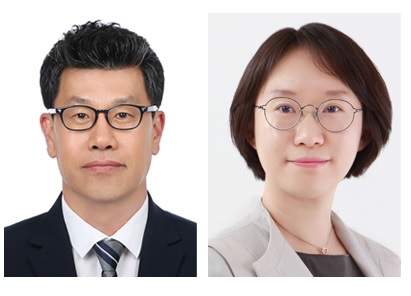 Two Professors Receive Awards from the Korea Robotics Society
< Professor Jee-Hwan Ryu and Professor Ayoung Kim >
The Korea Robotics Society (KROS) conferred awards onto two KAIST professors from the Department of Civil and Environmental Engineering in recognition of their achievements and contributions to the development of the robotics industry in 2019. Professor Jee-Hwan Ryu has been actively engaged in researching the field of teleoperation, and this led him to win the KROS Robotics Innovation (KRI) Award. The KRI Award was newly established in 2019 by the KROS, in order to encourage researchers who have made innovative achievements in robotics. Professor Ryu shared the honor of being the first winner of this award with Professor Jaeheung Park of Seoul National University. Professor Ayoung Kim, from the same department, received the Young Investigator Award presented to emerging robitics researchers under 40 years of age. (END)
2019.12.19 View 13554
Two Professors Receive Awards from the Korea Robotics Society
< Professor Jee-Hwan Ryu and Professor Ayoung Kim >
The Korea Robotics Society (KROS) conferred awards onto two KAIST professors from the Department of Civil and Environmental Engineering in recognition of their achievements and contributions to the development of the robotics industry in 2019. Professor Jee-Hwan Ryu has been actively engaged in researching the field of teleoperation, and this led him to win the KROS Robotics Innovation (KRI) Award. The KRI Award was newly established in 2019 by the KROS, in order to encourage researchers who have made innovative achievements in robotics. Professor Ryu shared the honor of being the first winner of this award with Professor Jaeheung Park of Seoul National University. Professor Ayoung Kim, from the same department, received the Young Investigator Award presented to emerging robitics researchers under 40 years of age. (END)
2019.12.19 View 13554